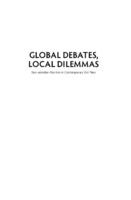Global Debates, Local Dilemmas
| dc.contributor.author | Minh Hang, Tran | |
| dc.date.accessioned | 2019-01-07 23:55 | |
| dc.date.accessioned | 2018-12-01 23:55:55 | |
| dc.date.accessioned | 2019-01-07 14:25:38 | |
| dc.date.accessioned | 2020-04-01T11:50:21Z | |
| dc.date.available | 2020-04-01T11:50:21Z | |
| dc.date.issued | 2018 | |
| dc.identifier | 1002645 | |
| dc.identifier | OCN: 1080547636 | en_US |
| dc.identifier.uri | http://library.oapen.org/handle/20.500.12657/27363 | |
| dc.description.abstract | "The practice of sex-selective abortion is on the rise globally, stirring debates about gender inequality, medical ethics and reproductive autonomy. This book is the first ethnography to document practices of sex selection in Viet Nam. It shows how and why abortions are used to select the sex of children and how Vietnamese individuals and health professionals are implicated in this illicit and controversial practice. Telling the stories of women who have undergone sex-selective abortions, it traces their passage through sex determination and abortion decision-making phases, and investigates their experiences during and after their sex-selective abortions. It describes the turmoil experienced by individuals who undergo such abortions and explores their interactions with the spectrum of social actors and health institutions that facilitate practices of sex selection. As the first ethnographic study on sex-selective abortions in Viet Nam, this book delves into socially sensitive terrain and sheds light on personally fraught individual experiences of reproductive agency. It documents societal responses to sex-selective abortions in Viet Nam and identifies gaps in the state’s capacity to regulate reproductive desire in a marketised economy. A resource for researchers, it contributes to ongoing debates on sex selection and provides a framework for developing relevant social policies, interventions and support services. ‘This pioneering study offers a nuanced and sensitive account of sex-selective abortion as human experience. Through thought provoking case studies, the book provides rare ethnographic documentation of the complex quandaries that arise as selective reproductive technologies are routinised across the globe.’ — Tine M. Gammeltoft, Department of Anthropology, University of Copenhagen" | |
| dc.language | English | |
| dc.subject.classification | thema EDItEUR::1 Place qualifiers::1F Asia::1FM South East Asia::1FMV Vietnam | en_US |
| dc.subject.classification | thema EDItEUR::J Society and Social Sciences::JB Society and culture: general::JBF Social and ethical issues::JBFV Ethical issues and debates::JBFV1 Ethical issues: abortion and birth control | en_US |
| dc.subject.classification | thema EDItEUR::J Society and Social Sciences::JH Sociology and anthropology::JHM Anthropology::JHMC Social and cultural anthropology | en_US |
| dc.subject.classification | thema EDItEUR::P Mathematics and Science::PS Biology, life sciences::PSX Human biology | en_US |
| dc.subject.classification | thema EDItEUR::J Society and Social Sciences::JH Sociology and anthropology::JHM Anthropology | en_US |
| dc.subject.other | Anthropology | |
| dc.subject.other | Abortion | |
| dc.subject.other | Sex-selection | |
| dc.subject.other | Social Policy | |
| dc.subject.other | Health Policy | |
| dc.title | Global Debates, Local Dilemmas | |
| dc.type | book | |
| oapen.identifier.doi | 10.22459/GDLD.2018 | |
| oapen.relation.isPublishedBy | ddc8cc3f-dd57-40ef-b8d5-06f839686b71 | |
| oapen.relation.isbn | 9781760462420 | |
| oapen.pages | 232 | |
| oapen.identifier.ocn | 1080547636 |

